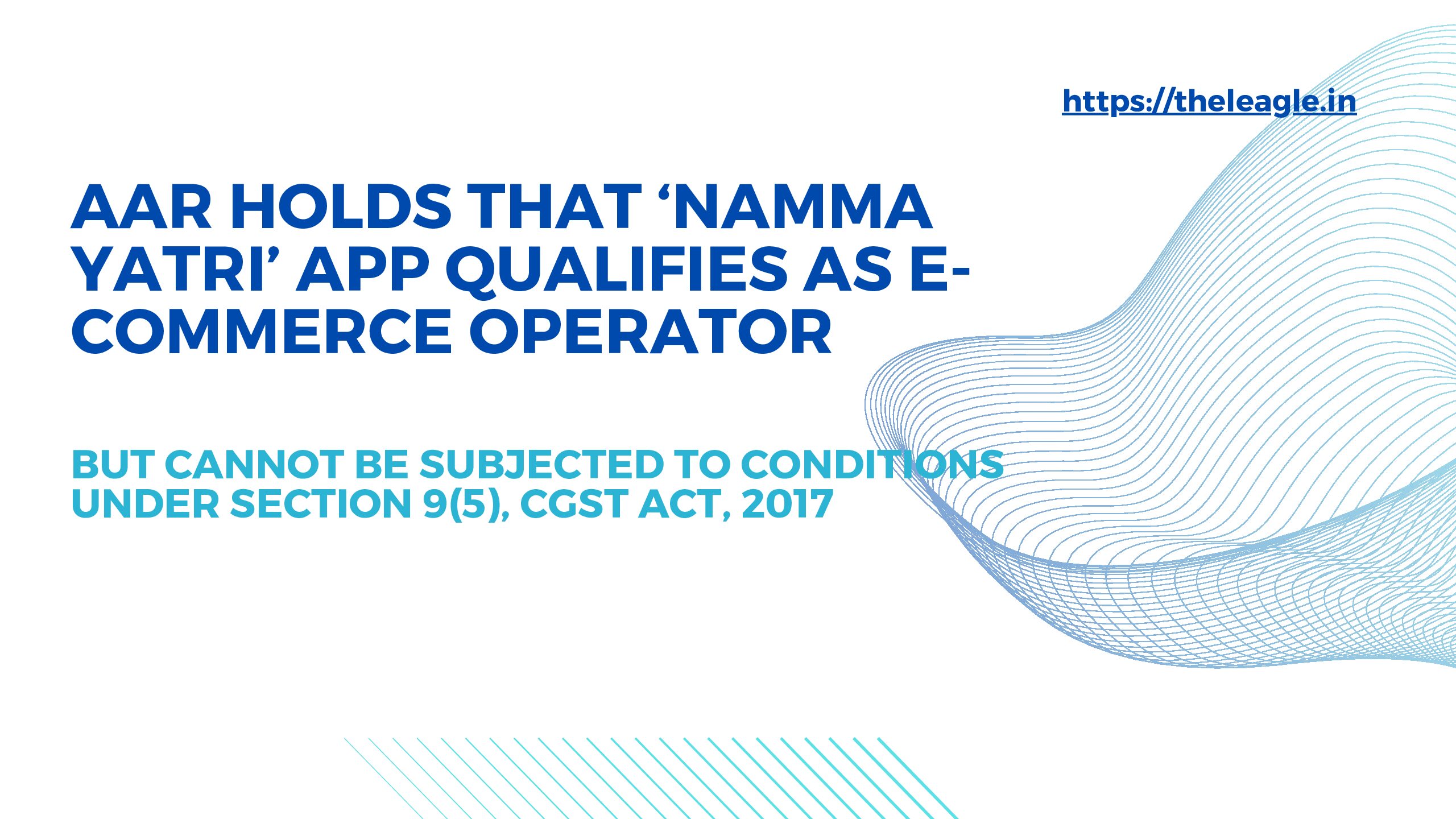In a recent ruling[1], Karnataka Authority for Advance Ruling (‘AAR’) made an interesting pronouncement where it held that the applicant in question only satisfied the definition of e-commerce operator under Section 9(5), CGST Act, 2017, but not the nature of supply as understood under the said provision. Thus, the applicant was not liable to discharge tax liability under the aforesaid provision.
Facts
Applicant in the impugned ruling was registered under the GST Act and in the business of providing technology services for merchants to connect to their preferred payment aggregators and payment gateways. The technology services in question involved the ‘Namma Yatri’ App, through which the applicant was connecting drivers to their customers. Any person desirous of using the applicant’s app were to apply online via a pre-subscribed form and upload soft copy of their documents and were thereafter granted the license to use ‘Namma Yatri’ App subject to the ‘terms and conditions between applicant and driver’.
The applicant argued that the subscribers enter business transactions independently and mutually agree on the terms and conditions and the applicant has no role in such transactions, directly or indirectly. Providing further details of their business model, the applicant stated that their role under relevant GST legislations is only concerned with collecting membership and subscription fee and remitting the tax collected on such fee to the State. And that relationship between subscribers registered on ‘Namma Yatri’ App is of supplier and recipient and any consideration involved is purely privy to their contract. The applicant neither arranges the services or related facilities or otherwise nor does it collect any consideration or any other form of payment.
e-commerce operators and GST
Section 9(5), CGST Act, 2017 states that:
The Government may, on the recommendations of the Council, by notification, specify categories of services the tax on intra-State supplies of which shall be paid by the electronic commerce operator if such services are supplied through it, and all the provisions of this Act shall apply to such electronic commerce operator as if he is the supplier liable for paying the tax in relation to the supply of such services: (emphasis added)
Section 2(45), CGST Act, 2017 defines an electronic commerce operator as any person who owns, operates or manages digital or electronic facility or platform for electronic commerce.
The above two provisions cumulatively empower the Union to notify certain e-commerce operators as deemed suppliers if the twin conditions of intra-state supplies and supplies being supplied through the e-commerce operator are satisfied. One of the questions AAR was required to answer was if the applicant could be subjected to the conditions of Section 9(5), CGST Act, 2017.
Applicant is e-commerce operator
Analysing the above provisions, the AAR correctly concluded that the applicant met the criteria specified in the definition of e-commerce operator. The services in question were also supplied by motor cab, satisfying the criteria prescribed in the notification issued by the Union under Section 9(5) wherein it was stated that tax on intra-State supplies for services by way of transportation of passengers by a radio-taxi, motorcab, maxicab and motorcycle shall be paid by the electronic commerce operator. However, the AAR concluded that the services in question were not provided ‘through’ the applicant, a necessary condition under Section 9(5) and concluded that:
… the word through in the phrase services supplied through electronic commerce operator, in Section 9(5) ibid, gives the meaning that the services are to be supplied by means of/by the agency of/ from beginning to the end/during entire period by the e-commerce operator. In the instant case, it is observed that the applicant, because of their unique business model, merely connects the auto driver and passenger and their role ends on such connection; they do not collect the consideration; they have no control over actual provision of service by the service provider; they do not have the details of the ride; they do not have control room/call centre, etc. The supply happens independent of the applicant and the applicant is involved only in the identification of the supplier of services and doesn’t take responsibility for the operational and completion of the ride. (para 19)
Thus, AAR concluded that the supply of services are not through the applicant, e-commerce operator, but independent of it and the notification issued under Section 9(5), CGST Act, 2017 would not apply to the applicant.
Conclusion
AAR was correct in its conclusion that even though the applicant satisfies the definition of e-commerce operator, the conditions specified under Section 9(5), CGST Act, 2017 are not satisfied for the applicant to discharge tax liability by an e-commerce operator. The applicant in the impugned ruling was only providing a minimal technology platform and nothing beyond thereby distinguishing it from cab aggregators. It is the latter that are subject to the conditions under Section 9(5), CGST Act, 2017 and the AAR was correct in accepting the applicant’s distinction between its business model and that of cab aggregators who actively facilitate the transactions on their platforms and applications. AAR’s conclusion is certainly well-reasoned and ensures that merely satisfying the definition of e-commerce operator should not place the entity under the onerous burden of Section 9(5), CGST Act, 2017.[2]
[1] In Re: M/s. Juspay Technologies Pvt Ltd, Advance Ruling No. KAR ADRG 31/2023, pronounced on 15.09.2023. Available at https://taxguru.in/wp-content/uploads/2023/09/In-re-Juspay-Technologies-Pvt.-Ltd.-GST-AAR-Karnataka.pdf (Last accessed on 26.09.2023).
[2] The impugned advance ruling aligns with another ruling in Re: M/s. Multi-Verse Technologies Private Limited, Advance Ruling No. KAR ADRG 36/2022, pronounced on 27.10.2022, available at https://taxguru.in/wp-content/uploads/2022/11/In-re-Multi-Verse-Technologies-Pvt.-Ltd-GST-AAR-Karnataka.pdf (Last accessed on 26.09.2023).
